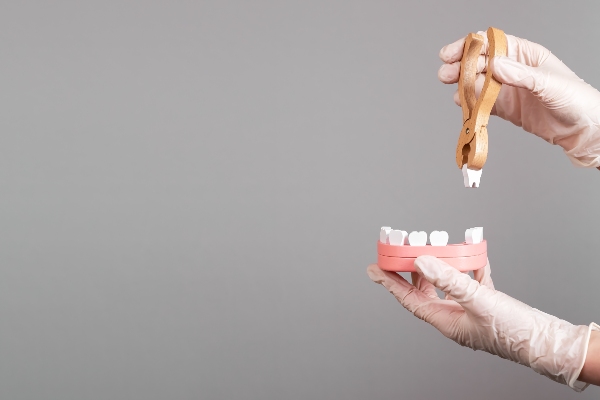A Guide to the Implant Supported Dentures Procedure

If someone is missing teeth, it is imperative to replace them as soon as possible. Implant supported dentures are one option for replacement. These fixed dentures allow for an effective and natural bite, which means that the wearer can eat normally. Unlike traditional dentures, implant-supported ones are attached to the jawbone, which prevents bone loss and provides a stable foundation.
Pre-procedure consultation
If someone is considering implant-supported dentures, a consultation with the dentist will ensure it is the right procedure. Not everyone is a good candidate for this replacement method. The patient must have sufficient jawbone density to hold the implants. The patient must also have good oral hygiene and be free of any medical conditions that could interfere with the healing process.
Implant-supported dentures procedure steps
The process of getting implant-supported dentures is not a quick one. There are numerous visits, and the average time for completion is between four to seven months, depending on the healing time after each step.
Placement of titanium rods
The initial step is to insert the implants, which are titanium screws, directly into the jawbone. To do this, the dentist makes a small incision in the gums and screws in each implant. For the upper jaw, the average number of implants used is seven, and for the lower jaw, usually four or five implants are placed.
The implants serve as the roots of the teeth. Time is needed for the jawbone to grow around the implants and for the gums to heal. This takes between three and six months.
Attachment of hardware
Once the area has healed, the patient comes back for a second visit. During this step, the dentist uncovers the implants and attaches abutments, which are metal extensions. These areas then need to heal, which takes about two weeks.
Fabrication of dentures
When the gums have completely healed, the dentist takes an impression of the gums and teeth. Based on this, a lab will fabricate a wax model. This allows the dentist to check the appearance and fit of the dentures and make any design modifications before the final product is made.
If the dentist and patient are happy with how the model looks and feels, the lab will make durable dentures that look like natural teeth. This fabrication process may take between one and three weeks.
Attachment of dentures
The final step is to secure the newly-made dentures onto the implants. The dentures are attached to the abutments, which will keep them in place. The dentist will make any final adjustments, and then the patient can begin to enjoy the new set of teeth.
Follow-up and long-term care
Your dentist may recommend one or two additional appointments to evaluate the healing of the tissues of the mouth and to ensure that the implants have fused properly. Total healing time will vary from person to person because it is influenced by a variety of factors, including:
- A patient's dental and overall health
- The state of the jaw bone pre-surgery
- Medications or underlying health conditions that can slow healing, such as diabetes or poor circulation
- Habits and lifestyle choices that can impact the body's ability to heal, such as smoking and excessive alcohol use
- A patient's compliance with instructions during the recovery, including dietary recommendations and proper home care
In general, implant-supported dentures are easy to care for and do not require much additional work. If the dentures are removable, they should be cleaned and soaked according to the dentist's instructions to prevent staining and odors. These practices also prevent the appliances from becoming brittle.
If a patient has opted for permanently attached implant-supported dentures, it is important to clean thoroughly along the gumline where the dentures meet the tissues of the mouth. A water flosser is one of the more effective ways to do this, as it can thoroughly sweep away food particles that a toothbrush cannot reach. Dentures should also be brushed with a soft toothbrush and non-abrasive toothpaste, preferably one that is made for denture cleaning.
Finally, remember to see a dentist on a regular basis for professional cleanings and evaluations. If you notice any changes in your dentures over time, be sure to discuss them with your dentist promptly.
Conclusion
There are numerous procedures available to replace missing teeth. Implant-supported dentures are an option for certain candidates, and they provide a strong foundation that allows for normal speaking and chewing. The implants also prevent bone loss and maintain the appearance of the facial muscles.
<p><em>Request an appointment here: <a href="https://totalcareimplantdentistry.com"> https://totalcareimplantdentistry.com</a> or call Total Care Implant Dentistry at <a href="tel:(760) 394-3088">(760) 394-3088</a> for an appointment in our Palm Desert office.</em></p>
Check out what others are saying about our dental services on Yelp: Implant Supported Dentures in Palm Desert, CA.
Recent Posts
More and more people are getting All-on-4® to replace missing teeth. This is a popular option for those missing all of their teeth. However, if you have lost teeth, it can be problematic for both your appearance and oral health. For example, you may feel embarrassed by how your teeth look when you smile or…
You've likely heard about dental implants and how they can restore a person's smile, but you might not know about All-on-4® dental implants and how they have revolutionized the way that people get implants to replace their lost teeth. We know that getting implants can feel like a scary process, but that's why we've prepared…
For patients missing multiple teeth, All-on-4® dentures are an excellent restorative option. These implant-supported dentures can transform a patient's smile. Many patients prefer this type of denture, as it is more secure and natural-looking than a regular denture.Before committing to this procedure, patients need to understand the process. The dentist should explain the benefits of…
All-on-4® provides a more stable and convenient option than traditional dentures. The latter is often recommended to those with missing teeth due to their affordability. A complete denture set can be cheaper than the cost of a single implant.All-on-4 combines the affordability of dentures with the bone-preserving properties of implants to create a long-term solution…


